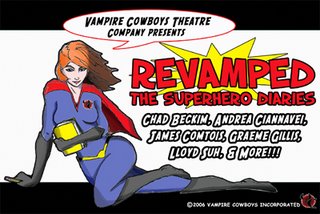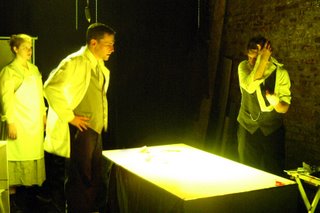I saw Neil LaBute's latest play Wrecks last night and was going to write a full-length 700-1,000-word essay on the show until I found this reader review in the New York Times that said it better than I ever could:
"In a nutshell, WRECKS is a meeting of the weakest in modern playwriting (Mr. LaBute) and the best in modern performance (Mr. Harris).
Seriously, I couldn't have put it better myself.
Wrecks is a one-person show starring Ed Harris about a grieving widower spilling his guts to the audience. At the end of the day, it's a weak show performed by an amazing actor.
And Ed Harris truly is amazing and captivating to watch live. I've always been a fan of Mr. Harris (seriously, is there anyone here who doesn't think he's an amazing actor?), so it was a thrill to see him perform in person for the first time. After seeing Faith Healer I was reminded how tough it is for an actor/actress to retain an audience's attention when reciting a monologue that clocks in at over an hour (and Wrecks is about a buck twenty in length), and he does so with ease and grace. Even with some of the more hackneyed anecdotes and pieces of writing in the script, I always had the impression that Mr. Harris was saying his own words. Perfectly at ease on the stage, he even kept his poise when forced to provide some impromptu ad-libbing for the sake of an audience member...
(At one point in the show, he pulled out a pack of cigarettes and asked the audience if anyone minded. One woman in the second row asked if he could refrain from smoking. He looked at her, smiled and said, "Are you really going to tell a widower that he can't have something? I was really just trying to be polite." That tore the audience up. Fifteen minutes later, when he pulled the pack out again, he looked at the audience member and said, "I'll wait. Fair enough?" Not once during this did he appear to be phased or breaking character.)
...which is something you don't necessarily see from actors whose bread-and-butter is film. Mr. Harris is perfectly at home performing on the stage and was an absolute delight to watch. His performance reminded me of why I love theatre.
As for the play itself, well...
As far as Neil LaBute's work is concerned, I'm quite ambivalent. I admired his first cinematic efforts In The Company of Men (which was previously a play) and Your Friends and Neighbors (which wasn't). I even put The Distance From Here on my first "Top Ten" list for Jamespeak. I also admire anyone so prolific in a medium where foot-dragging and indefinite "development" is the norm rather than an annoying anomaly.
But then, when Scott Walters writes, "Labute is deeply dishonest...moralistic AND voyeuristic, masochistic AND smug," and Isaac Butler points out, "The problem with...LaBute is that there are playwrights out there who really are interested in limning the depths of what we're capable of, psychologically, spiritually, politically, physically etc. ... I think this dishonesty of the more mainstream versions of this outlook...tarnish the reputations in a guilt-by-association way of [his] betters," it's hard — if not impossible — to argue otherwise.
The problem with the script of Wrecks is that when all's said and done there doesn't seem to be much to it. I left the theatre after Mr. Harris's curtain call thinking, "Oh, that's it? That's where we were going with that?" It doesn't particularly say anything that hasn't been said before by many other plays that are, quite frankly, much better.
I absolutely wasn't sold on the ending (and to be fair, no, I won't spoil it for you). It seemed very tacked-on, as if Mr. LaBute felt obligated to give the show one of those "sick and twisted" endings. It doesn't work. And I'm unsure of how Mr. LaBute wanted the audience to react (the audience I saw it with didn't react at all). Are we supposed to be horrified at the "revelation" at the end? Sympathetic? Disturbed? A little bit of all three, I suppose. I really wasn't any. I will say that regardless of the intended reaction (again, there was visibly none with the audience I attended with), Mr. Harris's character remained likable. I have to admit, I have no idea if that's due to the script, the direction or the actor.
(Outside the theatre, I figured out the pun of the play title, and all I could think of was, "Oh. I get it. [Groan.]")
To be fair to Mr. LaBute, this is his least blatantly misanthropic play to date and it's impressive to see that he's covering new territory (I've always given Mr. LaBute more of the benefit of the doubt than many of my blogger colleagues after seeing his movie Nurse Betty, which made me think that he's more than just a one-trick pony [as opposed to, say, Todd Solondz]). Also, although he does cover some of the same ground that he's covered before (seemingly nice guys being repellent in the context of dealing with their significant others), the sense of sadistic glee that you find in much of his other work is refreshingly absent here.
So again, I couldn't have put it better than "nycwriter623:" a meeting of the weakest in modern playwriting and the best in modern performance. If you go see Wrecks expecting great writing or a new entry into the realm of Great American Theatre, you'll be sorely disappointed. If you go see Wrecks expecting a great performance from a masterful actor, you won't be.
Expecting that dollar from Mr. Harris,
James "Total Wreck" Comtois
Labels: reviews, theatre














